Confessions of a Superhost
How I earned $19,843 in 16 months by inviting 122 strangers into my life.
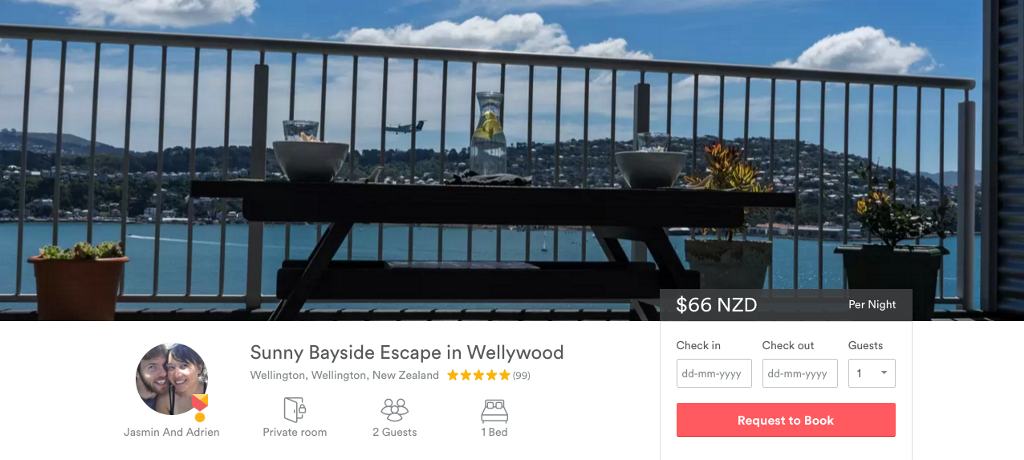
I got my first Airbnb booking request while vintage shopping on Cuba St. in Wellington, New Zealand.
The day before, my partner and I sat at our kitchen table, and enlisted our guest bedroom with ensuite bathroom on Airbnb. After weeks of waiting for the perfect light to take high-res photos of our apartment and fussing over our friendly-yet-cheeky description, we were finally clicking “Listed”.
The enlisting in itself was pretty underwhelming. Nothing happened. We stared at the page after it went live for a few minutes before we got bored and went on with the rest of our day.
The real magic happened when I got a notification on my phone in the vintage shop the next day; the first ding-ding that would, over the following 16 months, become a sound that represents $19,843 NZD* of net income.
“I just made $62 on my phone,” I told my friend, marvelling at the beautiful simplicity of Airbnb. I had accepted the first of 122 guests who would soon be paying to stay at my home.
So, what’s a Superhost?

Superhosts are people who have received 5-star reviews for 6 consecutive months, and they are reviewed every 3 months in order to maintain that status.
In reality, it’s a small badge on our profile page, but to many, Superhost status is what separates the serious hosts from the casual ones. Some guests will “only stay with Superhosts” because it pretty much guarantees you’ll have a good time.
I didn’t know Superhosts existed until I hosted one. Maybe it was fate, but one of our first guests was a Superhost from Queenstown. Even as a guest, she was still a Superhost. While she stayed with us, she took me to a local Meet-Up because I was new in town. That is what being a Superhost is all about. You make your guests feel at home in ways that surprising and thoughtful, even when you don’t have to.
But being a Superhost isn’t just hugs and teddy bears. Being a Superhost is about running a real business.
How do you become a Superhost?
It’s a challenge for new listings to break into the market. Wellington is a small city, so it’s a lot easier to start here than in cities like Paris, New York or London. Nice photos and a decent description will help, but at the end of the day, it’s the number of stars and reviews on your listing that people pay attention to.
So our launch strategy was to go for volume. We knew we needed a lot of positive reviews to boost our visibility, so we:
1. Undercut the competition in our first month
2. Offered airport pick-up and drop-off to get good reviews
3. Wrote reviews for all our guests to encourage reciprocity
Undercutting was the best decision we ever made. November 2014 was our best month in the first 11 months of hosting.
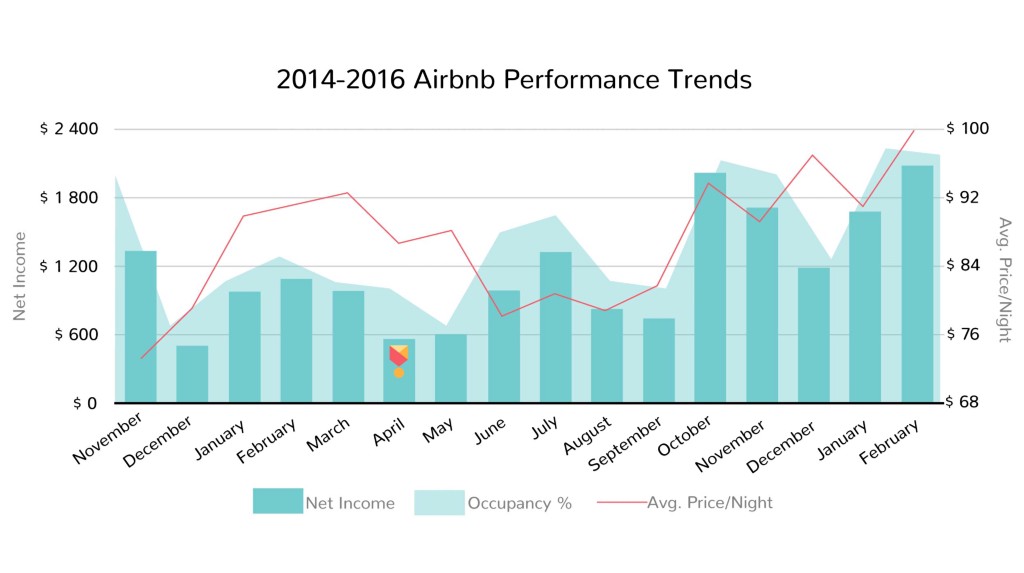
We officially became Superhosts in April 2015, which had no immediate effect because we were heading into winter in the southern hemisphere. Wellington winter is a wet and windy mess, attracting only the hardiest and cost-conscious travellers taking advantage of cheap flights.
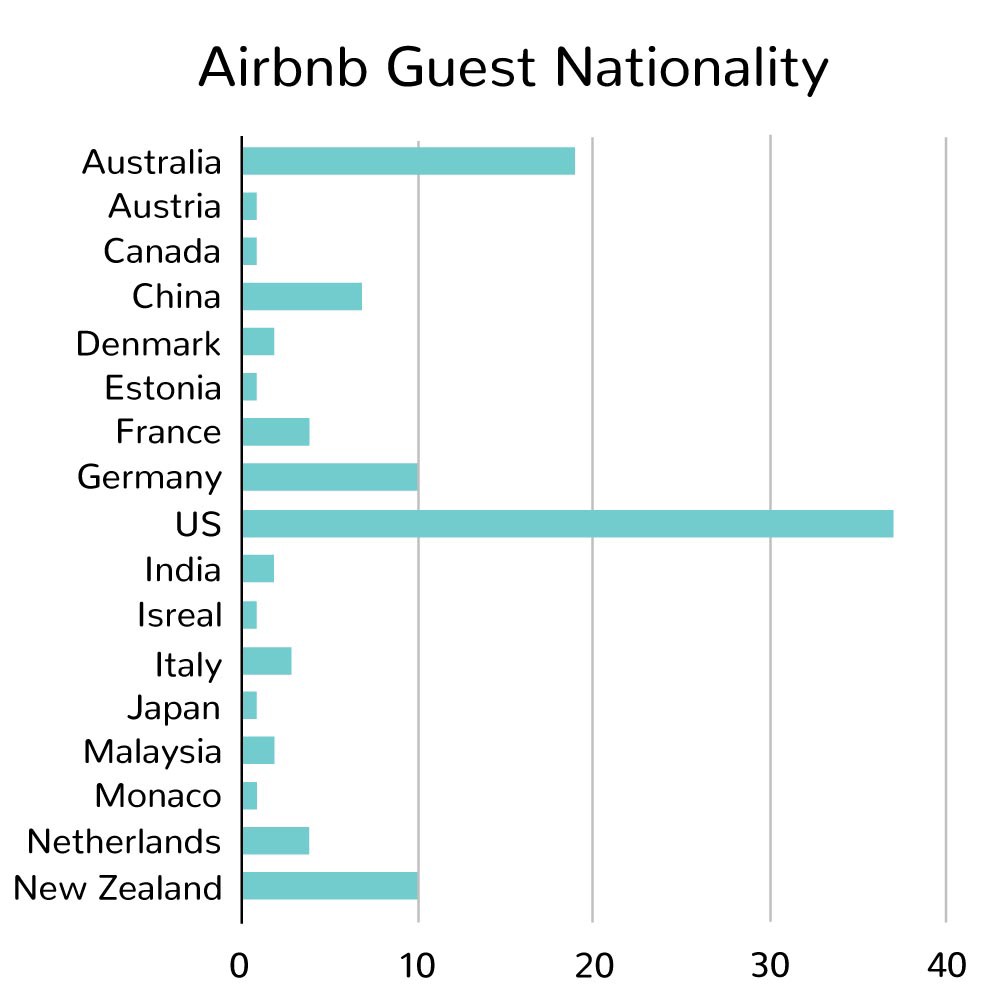
Countries that have direct flights to New Zealand brought us the most guests. Perth, Melbourne and Sydney in Australia fly directly to Wellington. In the US, the direct flight comes from Los Angeles (with a stop-over in Auckland). We expect the number of US travellers to continue growing since Air New Zealand has launched a new direct flight from Houston.
In October 2015, it felt like someone had opened the flood gates and people around the world were flocking to New Zealand for the summer season. With the increase in demand, we were able to charge $20 more per night than in November 2014, and went from 66% occupancy to 71%.
We made 44% of our net income in the final 5 months of hosting, over the spring-summer season.
But there’s a fine balance between occupancy and sanity.
If we had been crunching the numbers in 2015, we would have seen the correlation between price and occupancy, and maybe we could have lowered our prices.
But would we have done it? We were living in a 234 m² flat with 360° sea views. The guest bathroom even had a hot tub, which was a pain in the ass to clean. Every new guest required an hour of cleaning, a load of laundry, not to mention the constant vacuuming of the living areas and keeping the kitchen spotless. (Yes, we’re OCD, but that’s one of the reasons why we’re Superhosts.)
So even though we could have made more money at a lower price, it would have been a lot more work.
Having a low occupancy rate meant that we could have a few days a week to enjoy our gorgeous apartment in peace, to go away on mini-holiday weekends, to make a pizza and watch a movie in the middle of the night. You can’t do those things when you have guests.
There is a downside to charging more: you get very different types of travellers.
At our lower price, we hosted single, younger travellers on an epic adventure. There was the Swiss surfer whose surfboard barely fit in our Toyota Camry. A former Moroccan diplomat who quit her job and became an artist. The 60-something American country singer who wanted to record and start a YouTube channel in her basement in Virginia.
After we raised our prices, we started hosting business strategists from Dubai, strategic consultants from South Africa, and user experience designers from Silicon Valley. European millennials on their gap year after graduating university. Retired baby boomers who would show me photos and videos of their kids and grandchildren on their iPad’s.
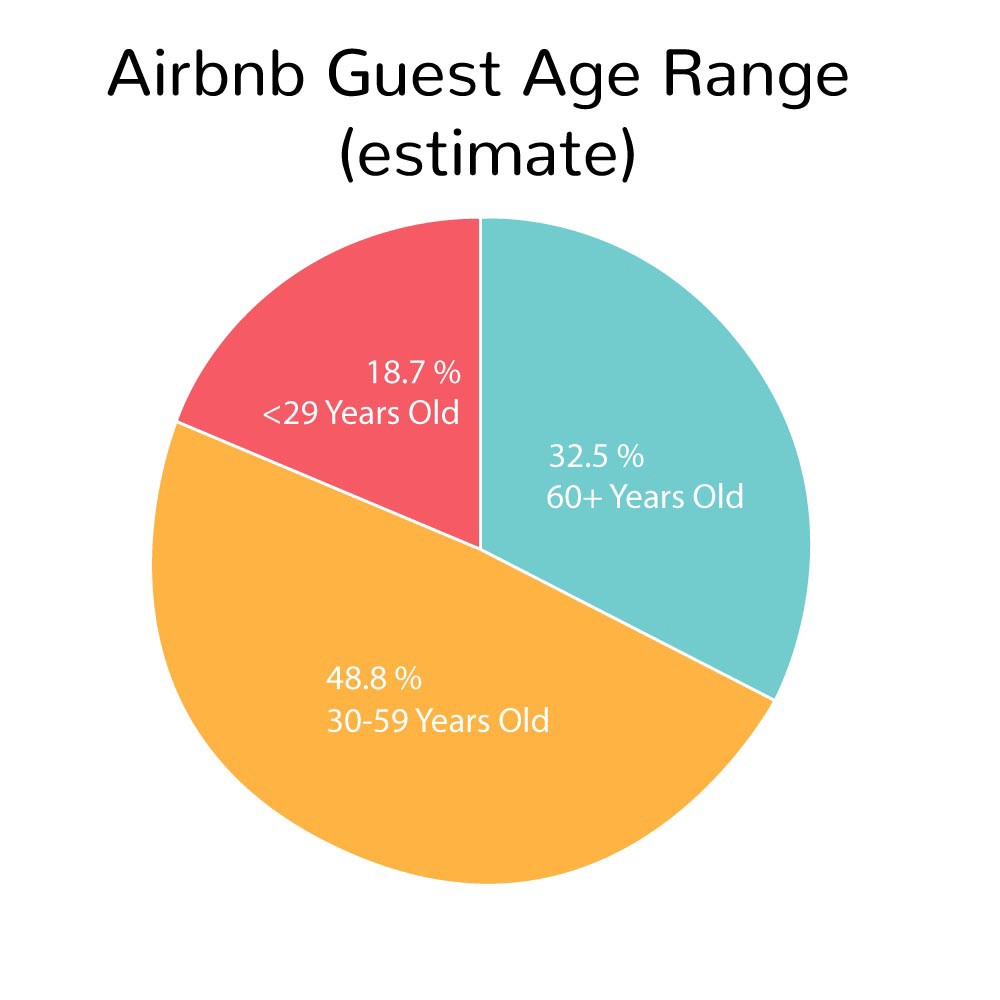
With the higher price, people’s expectations were higher. They asked for extra pillows and extra blankets. One guest made a comment about how “real B&B’s offer cooked breakfasts”, which I couldn’t help but take as a passive aggressive complaint about the toast, yogurt and granola that we were offering.
Little by little, the attitude changed from guests being really grateful that we were sharing our home with them, to expectations that seemed to come out of nowhere.
While these new demands didn’t impact our reviews, the change in attitude affected our day-to-day enjoyment of hosting. What started out as a fun experiment to meet travellers from around the world suddenly started to feel like a chore.
At the end of the day, it’s not really about the money.
With each new guest, it felt like we were a part of their journey. They came to New Zealand to find a new perspective in the most faraway place on earth.
One night, I took a Republican from Washington out for sushi and I broke the golden rule of hosting: Do not talk about politics.
“I would support universal healthcare if they didn’t give it to illegal immigrants,” she told me. “Did you know that anyone who gives birth in America can have their baby for free? I won’t even go to the hospital when I have a crazy high fever for days because it costs so much.”
It took me a second to decide whether or not I should respond. I’m Canadian, so my views on healthcare are about as liberal as it gets. Did I really want to engage in something that could end very, very badly?
I couldn’t keep my mouth shut.
“But aren’t you talking about two different issues?” I replied. “Immigration is one thing, and universal healthcare is another. Think about it this way, if you break your leg here in New Zealand, and you go to the hospital, they’re going to fix it for free.”
My Republican guest stared at me for a long while, as if it never occurred to her that she could get better healthcare while visiting a foreign country than in her own. We changed the subject.
Later that night, when we were getting ready to go to sleep, she stopped by my room and said, “You know, I don’t agree with you on everything you said tonight… but you really changed my mind on universal healthcare.”

Sometimes, you become part of the family.
There’s something about staying with a stranger that you’ll likely never see again that makes people want to spill their guts.
An Italian guest asked me to call his estranged son to find out which hospital he would be receiving surgery at the following day. The son refused to tell me, and I spent the day by his father’s side, contemplating the complexities of their father-son relationship.
“How do you show love to your son if you yourself never experienced love from your own father?” The Italian Father asked me.
“I used to test my mom,” I replied. “I was always pushing her away, even though I needed her. I was testing to see how much I could push before she would give up. She never did. Maybe you should tell your son that you’re here for him, and wait for him to reach out to you.”
Eventually, his son did return his call, and they returned to Italy together. A few weeks later, he called me and I asked him how his relationship with his son had changed now that they were back in Italy.
“Jasmin,” he said. “Our relationship is… how I always dreamed it would be. Thank you.”
No matter where my guests were from, what their jobs were, or how old they were, I realized we were all struggling for a better life, a better world.
It’s a Small Airbnb World, after all.
When my partner and I unlisted our guest room, I felt a pang of regret for all the travellers I would never get to meet.
I will miss bringing them into our home and seeing the look of astonishment on their face. “It’s even better than the pictures,” they would often exclaim.
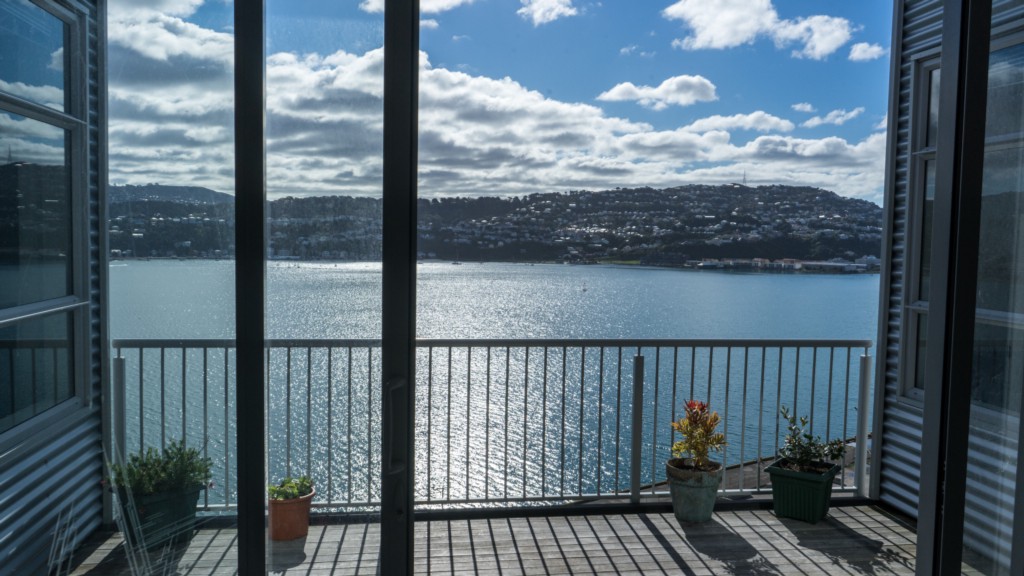
I will miss having morning coffee with them in the kitchen and learning about their lives a world away. I will miss hugging them goodbye and wishing them all the best on the rest of their adventure.
The best part of being Superhosts were the real friends we made. I have added a few of them on Facebook to follow their travels. We started playing boardgames with a couple after they moved to town from London. Another girl returned to Wellington, started working at a nearby café, and we’ll be attending a Buddhist event together later this week.
But now, it’s time for us to get on with our own adventure. The reason we started hosting on Airbnb was to save up for our own travels. Starting in June, my partner and I will be traveling for 8 months across the Pacific Islands and South East Asia.
I know that it’s only a matter of time before our guests will become our hosts, and we will meet again, somewhere in this world.
Support The Billfold
The Billfold continues to exist thanks to support from our readers. Help us continue to do our work by making a monthly pledge on Patreon or a one-time-only contribution through PayPal.
Comments